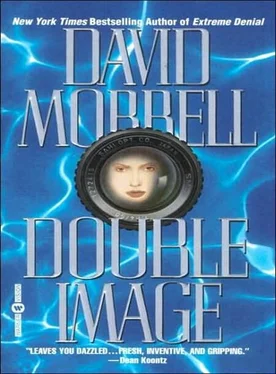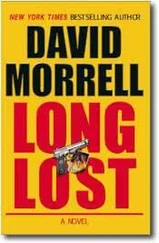Coltrane managed to find a parking space on Forest Avenue across from the beach. He slung his Nikon single-lens reflex around his neck and took a deep breath, surveying the lights of art galleries along the tree-canopied street. When he reached back into his car to get his copy of Packard’s Reflections of the City of Angels , he suddenly felt light-headed and almost collapsed across the seat. His side in pain, he grabbed the steering wheel, took another deep breath, and straightened. Sweat chilled his face.
Maybe this isn’t such a good idea, he told himself. It’s a wonder I didn’t faint driving down here. I belong in bed, not getting crushed by strangers at a cocktail party.
No, he thought, feeling much older than his thirty-five years. I need to start over.
THE RECEPTION IN THE RUSTIC- LOOKING SUNSET GALLERY had spilled out onto the street. Coltrane stepped past trendily dressed couples wearing expensive jewelry, their makeup and hair perfect, and ignored the looks they gave his sneakers. The gallery was crammed with people who spoke with pseudo-British accents. Many of them had lips so tight, they seemed to have lockjaw. They sipped from flutes of champagne, but Coltrane had no interest in finding the bar. He heard music playing from hidden speakers, a CD of a string quartet, it sounded like, but he couldn’t be sure – the conversations were too loud. All he cared about were Packard’s photographs, and even before he worked his way through the crowd, it was obvious that the sheer number of them was astonishing.
Protecting his side, he struggled to the nearest wall of photographs and felt excitement build in him when he realized that he had never seen any of them before. Again and again, a card next to a photograph indicated that each was from Packard’s own collection. Their dates ranged from the fifties to the nineties, making clear that Packard hadn’t given up photography in his later years. He had simply chosen not to let the public see his work. Coltrane’s excitement changed to dismay when the force of the images hit him. This second act of Packard’s career emphasized the decay that he had only hinted at in his earlier work. Each photograph was devoted to blight – a dead seagull trapped in an oil spill, an emaciated child eating garbage, a brush fire destroying a spindly multimillion-dollar house perched ridiculously on a Los Angeles hilltop.
Repelled, Coltrane forced his way to another wall, oblivious to the annoyed looks people gave him as he shoved past. The next pictures were even more disturbing – policemen standing around a woman’s corpse in an alley, a caged pit bull snarling at children who taunted it with sticks, a man attacking another man during a riot. The black-and-white images had been printed to emphasize their shadows, the bleakness chilling. The only thing missing was a photograph of jumbled skeletons being clawed from the earth by a backhoe. Stumbling away, wanting nothing more than to leave, Coltrane felt the back of his legs bump against an upright metal circle with spindles and nearly toppled backward over it, catching his balance just in time, sensing with embarrassment that what he had struck was a wheelchair.
He quickly turned. “I’m very sorry. I didn’t…” His apology froze in his throat when he recognized the chair’s occupant.
Randolph Packard was wizened, but he still bore an uncanny resemblance to photographs that had been taken of him in his prime. Even in a wheelchair, he was tall, his thinness emphasizing his height. His trademark shock of hair over his forehead had receded, becoming wispy and white, but it was nonetheless recognizable. The hypnotic eyes were darker, the face narrower, the nose more bladelike. But despite being withered, with liver spots, his slack skin barely concealing his skull, he was unmistakably Packard.
“This chair’s taken, thank you.” Packard coughed, as if he had sand caught in his throat.
“I apologize. I should have looked where I was going,” Coltrane said. “Are you hurt?”
“The truth never hurts. Tell me what you think of my photographs.”
Coltrane was taken by surprise. “They’re, uh…”
“Indescribable, evidently.”
“… impressive.”
“You don’t make it sound like a compliment.”
Coltrane was determined to be tactful. “They’re technically perfect.”
“Technically?” Packard coughed more forcefully, still unable to get the sand from his throat. “That camera around your neck – is that a fashion statement? Don’t tell me you’re a photographer.”
“Yes.” Coltrane stiffened. “Yes, I’m a photographer.”
“Oh, well, then. Since you’re a photographer. What don’t you like about these photographs?”
Coltrane felt bile in his stomach. “They’re too bleak for my taste.”
“Is that a fact.”
“Actually, if you want to talk about facts, they’re ugly.”
“Ugly?”
“Coming here was important to me. I needed hope, not despair.”
Packard didn’t say anything for a moment, only steadied his wrinkle-rimmed eyes on Coltrane, then nodded. “Well, good for you.”
“I beg your pardon?”
“I asked for the truth. You’re the only person in this room who gave it to me. What are you holding there?”
“One of your collections.”
“You brought it for an autograph?”
“That was my intention.”
“But now you’re not sure.”
“That’s right.”
“And you’re really a photographer?”
Coltrane nodded.
“Then tell me something else that’s true. Why did you become a photographer?”
Coltrane turned to leave. “I won’t bother you any longer.”
“I asked you a question. Quick now. Don’t think about it. Answer me. Why did you-”
“To stop time.”
“Indeed?” Packard’s sunken eyes assessed him. “What’s your name?”
“Mitchell Coltrane.”
“Mitchell…” Packard’s gaze went inward, then focused on him more tightly. “Yes, I know your work.”
Coltrane couldn’t tell if that meant the same as stepping in dog shit.
“Tell me why you want to stop time,” Packard demanded.
“Things fall apart.”
“And the center cannot hold? I didn’t know anybody read Yeats anymore.”
“And people die.”
“How very true.” Packard coughed again, painfully.
At once, an effusive, colorfully dressed man burst from the crowd. “There you are, Randolph. I’ve been looking everywhere.” He was in his forties, overweight, with a flushed face, a salt-and-pepper mustache, and several thousand dollars’ worth of designer labels. “Some people came in you absolutely have to meet.” The man gripped the back of Packard’s wheelchair. “Excuse us. Coming through, everyone.”
“Just a moment.” Packard’s frail whisper carried amazing force. He motioned for Coltrane to step close. “This is my card. I’d like you to come for lunch tomorrow. One o’clock sharp. Bring the book. I’ll sign it then.”
And Packard was gone.
WELL, WHAT DID I EXPECT? Coltrane asked himself, struggling through the crowd to get out of the reception. There were many mysteries about Randolph Packard, but everything Coltrane had read about him was clear about one thing: his personality. Even to his most sympathetic biographer, Packard was haughty. His overbearing attitude was variously explained as the consequence of having been spoiled by wealthy parents whose fortune he had inherited at the age of sixteen after the parents died in a boating accident, or as the imperious manner of a genius whose sensibility was constantly being assaulted by those around him.
Whatever its cause, Coltrane had definitely had a taste of it. Angry, he escaped from the art gallery, so distracted by his emotions that he didn’t notice the change in the weather until he got to where he’d parked his Chevy Blazer near the intersection of Forest and the South Coast Highway. At almost six o’clock in late November, darkness was natural. But not this much darkness. A remnant of the sunset ought to have been visible on the ocean’s horizon; despite the glow from streetlights, stars should have started to glitter. But now the sky was absolutely black, and the horizon was indistinguishable from the ink that had become the ocean. A wind stung his cheeks, flinging sand from the beach. The first drops of rain pelted his windshield as he hurried to unlock his car and get in.
Читать дальше












